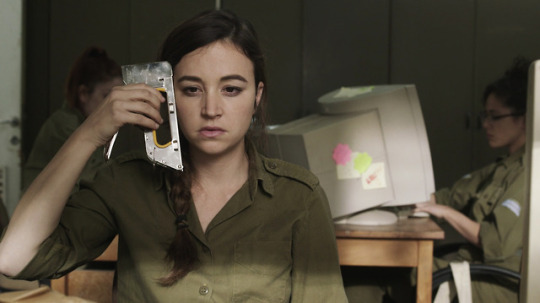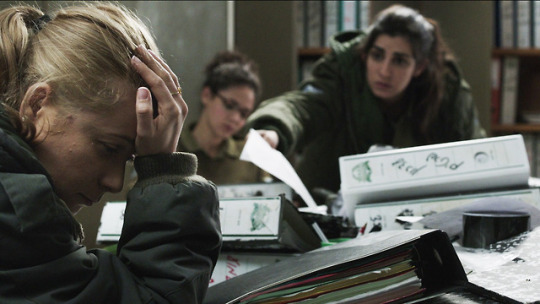#womenofcine
Explore tagged Tumblr posts
Photo









אפס ביחסי אנוש (Zero Motivation) (2014)
Dir. Talya Lavie
Country: Israel
Language: Hebrew
Rating: 4.5/5
“There’s a war on. Get a grip.”
In Tayla Lavie’s unorthodox Israeli war comedy “Zero Motivation” we never really learn what that war is. And, honestly, it doesn’t really matter. This war is won by making weak instant coffees. The weapons are staple guns and paper shredders. The enemy is the mundane and the cure is a Windows XP version of Minesweeper. There’s always a war on and in this surreal desert purgatory the questioning for specifics gets you nowhere.
Meet the jobnikim: soldiers with sometimes tragically boring desk jobs. And, in this case, all female. “Zero Motivation” was the first of its kind not only for featuring the almost kafkaesque existence of the jobinikim, but this is an army film about the women of the IDF. Israeli film, especially those that transcend cultural borders, often incorporate a critique or exploration of the IDF in some capacity as a harsh mirror to Israeli national identity. But popular films like “Waltz With Bashir” (2008), “Walk on Water” (2004), “Foxtrot” (2014), even “Yossi & Jaggar” (2004) focus on the male IDF experience. Meaning that Lavie came in, guns metaphorically blazing, by presenting a feminist and comedic critique of the most overlooked unit in the IDF’s arsenal—it’s bored female desk clerks.
The film opens on friends Daffi (Nelly Tagar) and Zohar (Dana Ivgy) taking a crowded bus to base camp, tethered together by shared headphones and lucky enough to grab seats Zohar had staked out for them. Soon after, the bus breaks down and they lose their coveted seats—forcing them to stand for the remainder of the miserable ride. A moment riddled with schadenfreude and sets the dark tone of the film.
Daffi, the dreamer, whines about her dreams of being transferred to a more civilized Tel Aviv for the remainder of her IDF service, but Zohar, the pessimist, doesn’t mind the mundane as long as she has Daffi with her. The Shredder NCO and Mail NCO, respectively, have diametrically opposed plans when it comes to surviving their service and in a movie about plans that never go right—it becomes their main conflict.
Meanwhile, a seemingly new recruit Tehila (Yonit Tobi) enters camp with an otherworldly presence, but she’s assumed to be Daffi’s paper shredding replacement so she can move on to a new post in Tel Aviv. Instead, Tehlia sets in motion a series of surreal events that drive home the point: you can enter the IDF, but can you ever really leave?
In a series of surreal, cruel, and hilarious vignettes Lavie achieves a feminine Catch-22-esque tale that under its layers of merciless poking fun captures a slice of reality, of shared misery, that feels so fresh and relatable—I mean, why else have shows like “The Office” captured the hearts of millions worldwide? It’s a brilliant response to an institution that is difficult to talk about, but made palatable enough for any one who likes a good tease.
#female filmmakers#women directors#womenofcine#female directors#female directed films#israel#israeli film#israeli cinema#talya lavie#zero motivation#אפס ביחסי אנוש#hebrew#hebrew language film#hire these women#female filmmaker friday
69 notes
·
View notes
Photo







あん (Sweet Bean) (2015)
Dir. Naomi Kawase
Country: Japan
Language: Japanese
Rating: 4/5
“Sweet Bean” is a honeyed film that trickles slowly, but it’s not cloying. Framed by the annual return of the cherry blossoms, the film meditates on stories, details, and hunger for connection. It has a fast moving city backdrop that blurs in and out of focus that the protagonists seem to exist outside of. It’s the heartfelt loneliness of its protagonists that gives the film purpose as we move forward slowly—almost as if we are pushing through fresh, sticky an (sweet red bean paste—and the title of the film).
An is the unifier of the film. Sentaro (Masatoshi Nagase) is a quiet dorayaki—a kind of Japanese pancake dessert—stand owner. He goes about his days tending to his carefully crafted cakes with little interaction with others. Though his dorayaki is happily consumed by chatty teens, his bargain brand an filling is substandard. In this case—store bought is not fine. This draws in the delightful Tokue (Kirin Kiki), an elderly woman with visible physical disability to her hands, to apply for a part time job at Sentaro’s stand. And after multiple refusals, in typical food appreciative narratives, he is so moved after trying her legendary an that he hires her on the spot.
What follows are gorgeous, loving shots of Tokue’s process and deep appreciation to all that came together in nature to make her red bean paste come to life. A scene that is a film within itself With the reverence of a sommelier master and a beloved terroir—Tokue sings praise of the fields and journey the beans have experienced and produces a perfect an long before the rest of the world has risen. Naturally, the dorayaki have a “trendy stand at Brooklyn’s Smorgasburg” effect. They sell out, day after day.
Kawase captures her actors in intimate close shots, blurring them out of the world they struggle to be a part of, but also allowing us to be privy to the sublime performances by the lead actors that are quiet and filled with restraint.
“Sweet Bean” is a love story to the forgotten fringe’s of our society. To those who seek and simultaneously repel the comfort of constant companionship. It’s a study in looking beyond what you know to find what it is you need.
#women directors#womenofcine#female filmmakers#japan#japanese film#naomi kawase#sweet bean#an#あん#japanese language film#screencaps#caps#filmshot
39 notes
·
View notes
Photo









Fed Up (2014)
Dir. Stephanie Soechtig
Country: USA
Language: English
Rating: 1.5/5
You know, I was quite excited for the first documentary of this project. Women have made incredible contributions to the world of documentary and—at least I feel—are almost completely removed from the “greats” of documentary history. Plus, the concept behind “Fed Up” is hard to baulk at. There is so much greed in business and American politics—it comes to no surprise that the meeting of those greeds results in something that hurts the populous. And maybe that’s the problem—“Fed Up” presents known fact as surprise real life horrors and—even when this film was released—I don’t think anyone was shocked.
The ultimate point of “Fed Up”: sugar is bad and the US government is so beholden to the sugar industry it puts sugar in everything we consume and it, as a result, is making our country fat and killing us. Great.
The movie constantly attempts to remove blame from the consumer—or the fat bodied subjects who are trying to better their lives and are unwittingly consuming buckets of sugar—and yet it still feels entirely condescending. We hear these families, most of whom have limited resources and are in remote locations without access to nearby fresh produce and the like, doing their best and are shown visuals that that “best” is not even close to the right choices. It’s an odd message and one that continues to the film’s conclusion, which leaves us with “everyone eventually failed.” It’s not optimistic. It’s sad. And we’re left wondering what the point of this film was.
Ultimately, I feel this film was very well-intentioned, but failed across the board. Their points felt wildly dated. The lack of scientific analysis—especially from the authors of many of these cited journals (bad or otherwise) feels like sloppy journalism.
#Stephanie Soechtig#fed up#documentary#Female directors#female filmmakers#female filmmaker friday#female directed films#female documentary#womenofcine#hire these women#women directors#caps#screencaps#filmshot
0 notes
Photo










Mary Goes Round (2017)
Dir. Molly McGlynn
Country: Canada
Language: English
Rating: 2/5
We open on our hero’s therapy session in which she’s asked her guiding question: “Are you a piece of shit?” Mary’s soulful look quickly cuts to a night of heavy drinking, dancing on tables, and trying to convince a cab driver to get pizza with her. This seems to be par for the course for Mary (Aya Cash) whose antics have exhausted her partner. The following day we believe she’s attending an AA meeting, but it turns out she’s the addictions counselor. Not great.
Mary Goes Round plays a lot with these ironic situations that never quite land in the dark humor category, but they don’t really operate in any other space either. When Mary attends a Pinterest board inspired baby shower, and begins to get belligerently drunk, the effect could be something dark, comic, but instead it’s just sad and confusing. Ditto for when she leaves said party and totals her boyfriend’s car into a “Watch For Children” sign. They’re merely set pieces to propel the story to its much more predictable—“prodigal child returns home to reconnect with dying parent and cope with issues before said parents dies” routine. It’s hard to know at times then what it is we’re supposed to be feeling from Mary Goes Round and are left with what feels like a lot of missed opportunities.
When Mary returns home to Niagara Falls the cinematography expertly captures this familiar and downtrodden tourist destination with such character the town effectively becomes a secondary character in the film. From teasing tourists for walking around in “garbage bags” to cozying up to worn and beloved institutions that provide moments of clarity for the characters—Niagara seems to be the one thing keeping all the players centered and cared for.
Despite the wandering narrative that dips into comfortable, expected tropes—Aya Cash gives a breathtaking performance filled with heart. Her subtle anguish and defensive humor is not only believable, it softens you to Mary in a way the film could not survive without. Similarly, a fantastic performance is given by Melanie Nicholls-King who plays Lou—a confident AA member who helps Mary and falls off the wagon herself. In fact the scene between Mary and Lou when Mary discovers Lou has fallen off the wagon is one of the film’s most quietly brilliant moment. Two sort-of friends too caught up in their own lives to notice the other had fallen down bring dignity back to other by quietly recognizing their pain and providing help that is not shrouded in sympathy.
In fact, that is the main success of Molly McGlynn’s direction and script: she brings so much respect and humanity to the portrayal of alcoholism, especially generation alcoholism. There are definitely moments in the film where it drives moments of intense melodrama, but by and large you feel for the characters’ crippling humanity and swell in the moment Mary decides to get her 24hr AA chip to quit drinking for good—a line from the film says it best: “good people do shitty things.” If only the rest of the narrative elements had the same level of humanity and originality.
#women directors#cinema#film#mary goes round#molly mcglynn#blockbusthers#blockbusther#womenofcine#female filmmakers
0 notes